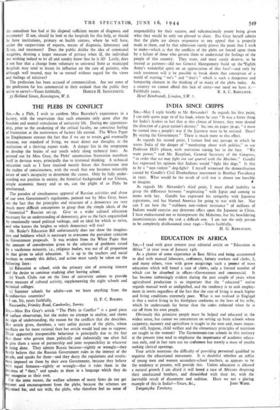THE PLEBS IN CONFLICT
Stn,—As a Pleb, I wish to confirm Miss Reaveley's experiences in a factory, with the reservation that such emotions only arose after the freedom and mental stimulation of university life. During my apprentice- ship, prior to the awakening of the critical faculty, no conscious feeling of frustration at the narrowness of factory life existed. The White Paper on Employment stresses the fact that if we are to retain; end eventually increase, our standard of living, we must direct our thoughts to the realisation of a thriving export trade. A danger lies in the temptation to develop the brains of our youth solely along technical lines. As pointed out by Miss Gray, the Plebs' unconscious frustration manifests itself in devious ways, principally due to irrational thinking. A technical education such as I have received merely forces this frustration into the realms of consciousness, with the result that one becomes miserably aware of one's incapacity to determine the causes. Only by fully under- standing our position in society, the historical background of our Unions, simple economic theory and so on, can the plight of us Plebs be ameliorated.
The paradox of simultaneous approval of Russian activities and abuse of our own Government's regulations, pointed out by Miss Gray, bears out the fact that the principles and structure of a democracy are very much more difficult conceptions to grasp than the simple ideals of the " theoretical " Russian set-up. Give us a wider cultural education necessary for an understanding of democracy, give us the facts ungarnished by emotionally toned political verbiage, and an ideal for which to strive, and who knows the heights to which democracy will rise? • Mr. Butler's Education-Bill unfortunately does not show the imagina- tion and boldness which is necessary to overcome the prevalent cynicism to Government proposals. It was evident from the White Paper that the amount of consideration given to the solution of problems raised by a vociferous minority, i.e., religious bodies, was out of all proportion
to that given' to adult education. It is up to the teachers and social workeri to remedy this defect, and action must surely be taken on the- following lines:
(a) Education at school, with the primary aim of arousing interest and the desire to continue studying after leaving school.
(b) Youth Clubs run on the lines of university unions to provide some measure of cultural activity, supplementing the night schools and technical colleges: (c) Summer schools for adults—can we learn anything from the Scandinavialt countries?
—I am, Sir, yours faithfully, Ruscumbe, Frimley Road, Camberley, Surrey.
G. F. C. ROGERS.


























 Previous page
Previous page